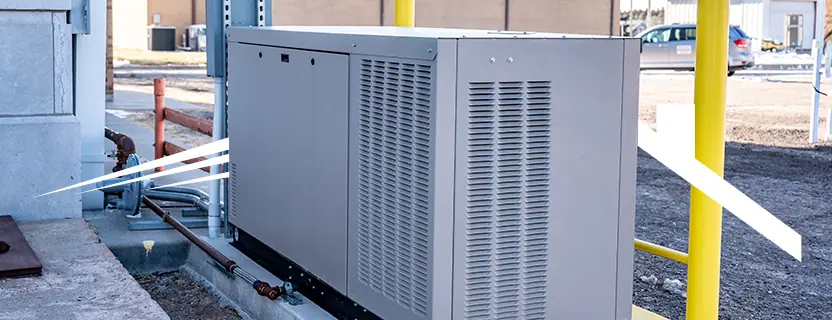
A power outage can be highly disruptive, causing inconvenience, especially if you work from home and depend on your internet service to be up and running for that important meeting, along with, discomfort, and potential food spoilage. A backup generator will prevent these problems by delivering essential power to your home when your primary source fails.
While a backup generator may seem like a significant investment, its benefits can be invaluable to households when emergencies occur. Are home backup generators a worthwhile purchase? Check out this guide to learn more.
Backup generators supply electrical power during outages or supply interruptions. These dependable alternative electricity sources ensure your essential appliances and systems can still operate when the power goes out. You can get generators for homes, businesses and other settings, making them a versatile tool for anyone who wants to protect themselves from outages.
If you want to keep your home comfortable and your essential appliances running during a power outage, a generator will provide a sense of security and convenience that’s worth every penny.
Consider these priorities to decide whether to get a backup generator.
Portable and standby generators are the two types of backup generators for homes. Standby generators are permanent fixtures installed outdoors, while you can move a portable generator wherever you need it. Depending on the generator type, it may run on a fuel like propane, natural gas or gasoline.
When choosing between portable and standby generators, you must understand their differences and advantages to make the right choice for your home. Here are some considerations to help you decide.
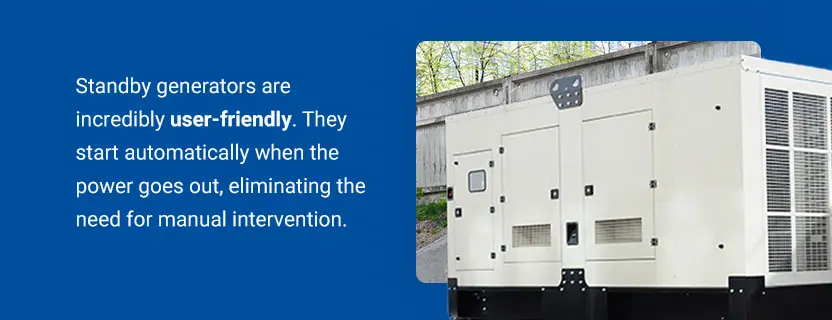
While standby generators may have a higher upfront cost, their reliability, convenience and overall capacity make them a worthwhile investment for homeowners seeking a dependable backup power solution. Portable generators can work well for homes with less frequent and intensive emergency power needs, but they require more long-term effort, monitoring and expertise to ensure they meet your home’s needs.
Permanently installed backup generators offer homeowners many benefits, and they can quickly become invaluable additions to your home. Whether you want to protect your family during power outages or ensure essential appliances continue operating, these devices provide a reliable and convenient backup power source. Let’s take a look at some of the advantages.
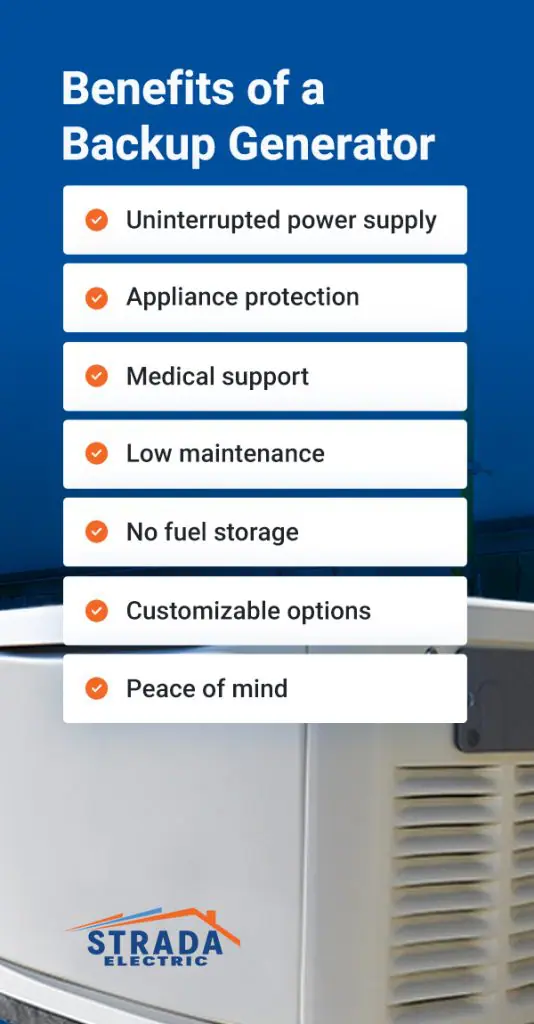

Investing in a backup generator is a significant decision for homeowners. Whether you’re looking to protect your family during power outages, keep essential systems running or ensure your home remains safe and comfortable, here’s a list of what to look for in a backup generator.
The first step in choosing the right backup generator is assessing your power needs. Identify the essential appliances and systems you want to keep running during a power outage. These might include lights, refrigeration, heating or cooling, sump pumps and medical devices. By determining your power requirements, you can select a generator that matches your specific needs, ensuring it can support your home’s critical circuits and devices.
Getting the best generator type for your needs will allow you to stay comfortable during power emergencies. Consider what you want your generator to do, what maintenance you’re willing to perform and the cost to help you narrow down your options. Consider a portable generator if you need something smaller that works best with occasional use. Choose a permanent standby generator for a solution that turns on automatically when the power goes out, requires no fuel storage and can handle all your needs.
Your generator’s fuel source is another crucial variable. Standard options include natural gas, propane, diesel and gasoline. Consider the availability and cost of these fuels in your area. Natural gas and propane are convenient and cleaner, while diesel and gasoline are readily available but may require more maintenance. Additionally, some fuels are only available for specific generator types, so consider this, too. Choosing the fuel source that aligns with your budget and area will help you select the perfect generator.
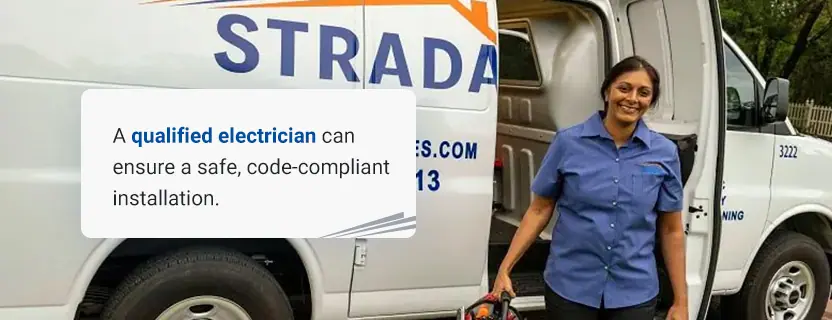
Professional installation is a wise decision, especially for standby generators. These units permanently connect to your home’s electrical system and need a transfer switch to isolate them from the grid. A qualified electrician can ensure a safe, code-compliant installation. Portable generators are more DIY-friendly but still require placement in a well-ventilated, secure location. While getting a professional installation will increase your upfront costs, you’ll save money in the long run. Think about your safety, experience and long-term and short-term costs to pick the best installation for your home.
Regular maintenance is essential to keep your backup generator in optimal condition. Standby generators often perform self-diagnostic checks, but you’ll still want to get regular professional inspections at least once a year to identify and address potential issues. Professional maintenance checks include changing the oil, checking spark plugs, testing the battery and ensuring all components work correctly. Portable generators also need routine maintenance, including oil changes and fuel stabilizer use to prevent fuel degradation. Proper upkeep ensures your generator is ready when needed, maximizing its life span and reliability during power outages.
Establish a realistic budget when considering a backup generator. Standby generators are a more substantial upfront investment due to their automatic operation and capacity to power your entire home. While more budget-friendly, portable generators may require additional expenses for transfer switches, extension cords and fuel storage. Consider initial cost, ongoing maintenance and operational expenses. Remember, investing in a reliable generator can save you money over time by protecting your home and preventing costly damage during outages.
Noise levels can be critical when choosing a backup generator, especially if you live in a densely populated area or have close neighbors. Standby generators are typically quieter than portable ones due to their insulated enclosures and advanced muffler systems. Portable generators will usually be louder than standby generators, so be considerate of your neighbors when investing in one. Consider your surroundings and your area’s noise regulations to ensure you get a generator that won’t disturb you or your neighbors during its operation.
Backup generators are subject to local regulations and permitting requirements, which can vary widely depending on your location. Local authorities often have rules regarding setback distances from property lines, noise restrictions and safety measures. Researching and complying with these regulations is essential to avoid potential legal issues. Additionally, some areas may have emissions restrictions, which could influence your generator fuel source. Consult with local authorities or a professional to ensure your generator meets all local codes and regulations, preventing future complications.
Your generator installation cost will vary significantly depending on your location and generator type, fuel and size. The larger and more powerful your generator, the more it and the installation will cost. Prepare to invest a decent amount into the installation — you need reliability to protect your home.
Standby generators require a more involved installation, so you can expect to pay between $4,000 and $25,000, though your exact price will change with your generator and installation service. You’ll see much lower starting costs for a portable generator since you can usually set up everything yourself. Your generator is an investment in your household’s safety — backup generators are worth it if you pick the best option for your budget and needs.
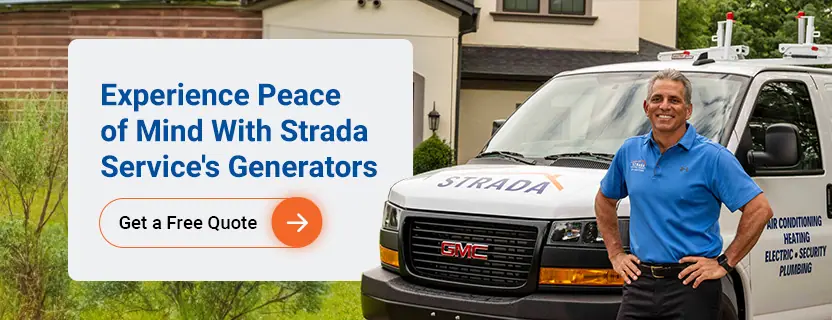
Consider investing in permanent backup generators if you want to reduce home disruptions. At Strada Services, we carry industry-leading residential backup generators and expert generator services to help keep your home safe during emergencies. Our dedicated team of professionals keeps your home powered and protected, no matter the circumstances. Experience peace of mind with our high-quality Generac backup generators and comprehensive services.
Don’t let power outages disrupt your life and put your property at risk. With Strada Services, you can invest in a reliable backup generator to maintain a secure and comfortable home. Contact us today to get a quick quote and explore our residential backup generator options and professional generator services.